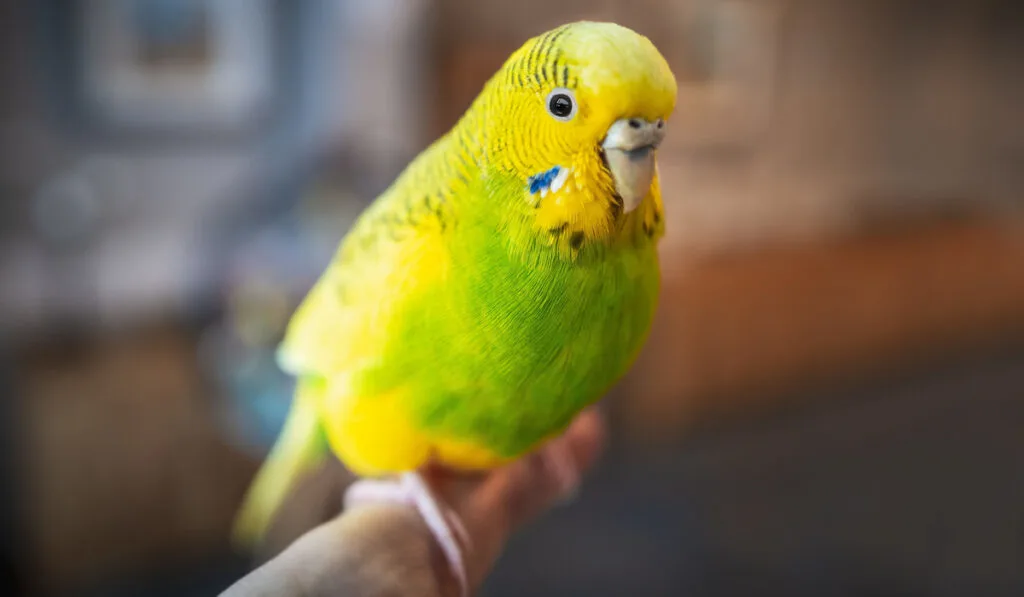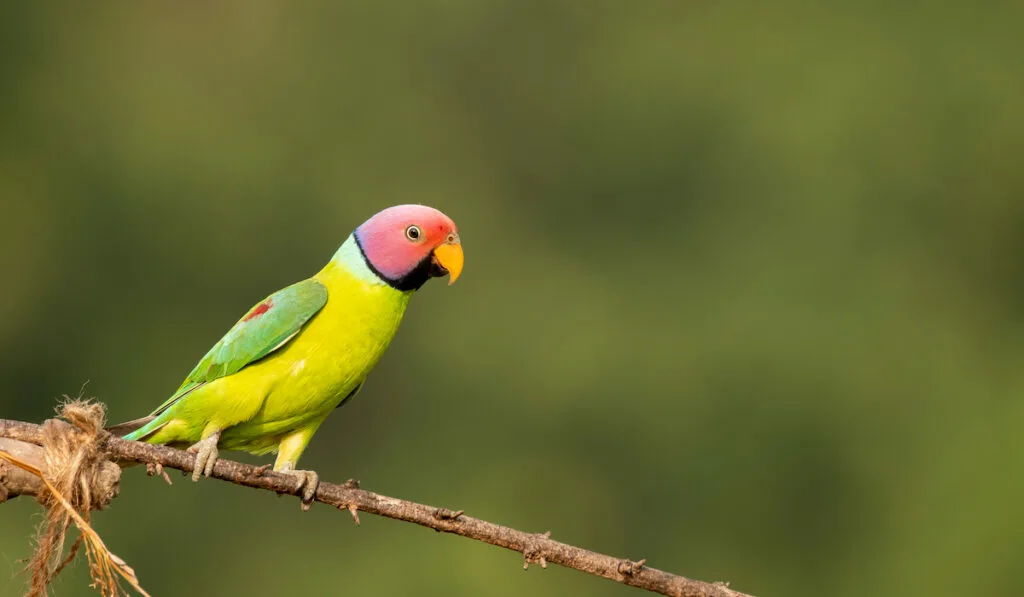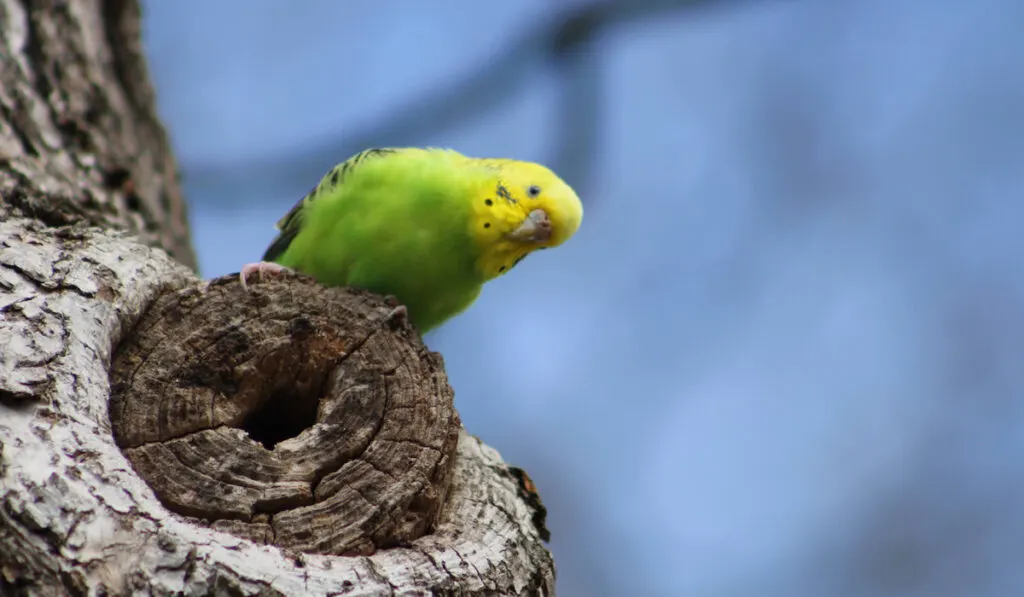When you finally get your own parakeet, you may notice some behaviors you never knew parakeets had.
Some of these behaviors might be weird to you. Then again, you might find them amusing.
One of the unusual behaviors you may notice in your parakeet is puffing and posturing.
Of course, you are probably wondering why parakeets puff up.
Why do parakeets puff up?
Parakeets puff up for various reasons. The foremost of these reasons is body temperature regulation.
But besides that, parakeets may puff up for other reasons – some of them good, some of them not so good.

In the rest of this post, we discuss some of the other reasons your parakeet puffs up.
We also explain how you can tell if the signs are good or bad.
Table of Contents
9 Reasons Your Parakeet Puffs Up
When your parakeet puffs up, it will not be hard to tell.
You will notice a change that involves ruffling its feathers and posturing dramatically.
When this happens, it could be for one of the following reasons:
They Are Cold and Trying to Keep Warm
This is the most common reason why parakeets puff up.
In fact, puffing up to keep warm is commonplace to many other birds.
When parakeets are cold, they will puff up to conserve their body heat.
If you pay attention, you may notice that your parakeet puffs up more commonly during cold winter days.
If your parakeet is in an environment colder than what it is used to, it may puff up regularly.
The point of puffing their feathers is to make space to trap air.
The air trapped beneath their feathers becomes warm, and in turn, it warms the parakeet.
It is almost the same way blankets warm us up.

The more air a parakeet can trap in its puffed-up feathers, the warmer it will get.
The good thing about keeping themselves warm with this method is that it is more conservative. Instead of generating heat, the parakeets save heat, thus expending less net energy.
It Is Trying to Show off and Get Some Attention
Interestingly, your parakeet may be puffing its feathers to show off and get some attention.
It may be showing off to you, a visitor, and if it is a male, it may be showing off to a female bird.
Excitement
Parakeets may also puff up when they are excited.
Being as social as they are, they display their emotions in various ways. One of these ways is using their feathers.
An excited parakeet puffing its feathers may also make happy sounds – a confirmation of why they are puffing their feathers up.
It Is Trying to Clean Itself
Your parakeet may also puff its feathers up while trying to clean itself.
The puffing process helps to shake its plumage a bit and shake off debris and dirt.
It Wants a Bath
Not all parakeets like taking baths – their affinity for baths depends on their personality.

If your parakeet loves baths, you will notice it washing in the water dish inside its cage every few weeks.
When it is about to bathe, it may puff its feathers in excitement.
It Is Trying to Straighten Its Feathers
Sometimes, the feathers of a parakeet may get crooked.
When this happens, they may get uncomfortable. But they will also try to remedy the discomfort, and one way they do this is to puff and ruffle their feathers.
Expectedly, this will straighten out whatever feather that was out of place.
Your Parakeet Is Sleepy
In some other cases, when your parakeet is all puffed up, all it wants is to sleep.
Of course, if it goes to sleep shortly after, then you know it was fluffing its feathers in preparation for a nap.
It May Be Anxious or Upset
As we said before, parakeets are social animals.
They communicate through various means, even their feathers. So, sometimes when they are upset or anxious, they puff their feathers to make this known.
When your parakeet is upset, you may notice other signs besides puffiness.
One of these signs is that it will twist its tail as it puffs up.
Another sign you may see in an upset parakeet is that it will keep its wings away from its body.

It May Be Sick
When a parakeet is puffing its feathers, it is not always good.
Sometimes, this act is a sign of something more serious. Your parakeet may be sick.
As if that is not bad enough, you may not notice the difference between a sick puff and a happy puff readily. Like many other birds, parakeets can conceal their sickness.
This is a trait they learned to avoid being preyed on in the wild.
Since the puffiness of a healthy bird and a sick bird are similar, you may have to pay extra attention to differentiate them.
When your parakeet remains puffed up for most parts of the day, look out for other symptoms of sickness.
One of the other symptoms you will notice in a sick parakeet is lethargy.
Typically, a parakeet will react to any stimuli around it. For instance, if you move close to it, it may tense up its feathers.
But when it is lethargic, it will not really react to such stimulus.
Besides lethargy, a sick parakeet may show signs of diarrhea and loss of appetite.
Other symptoms include sticky poop, sleepiness, noiselessness, sneezing, weight loss, unusual temperament, and rapid breathing.
The sick parakeet may also restrict itself to a corner of its cage, and it may sleep unusually.
For one, it may sleep with its head rearing forward instead of tucked over the shoulder. It may also nap on its 2 feet instead of having one foot down with the other slipped in its feather.

All in all, when you notice any of the signs above, you should get your parakeet to a vet. However, if you cannot get it to a vet immediately, get it close to a safe source of heat.
Supplemental heat comes in handy for sick birds. Fluids, a serene environment, and proper nutrition will also help.
Conclusion
Parakeets puff up for many reasons – both good and not so good.
The onus is on you to pay attention to your bird so you can see the signs that distinguish bad puff-ups from good puff-ups.
You should note that if your parakeet puffs up most times, then its room may just be too cool.
In such cases, confirm the temperature and adjust accordingly.
Resources
- https://peteducate.com/why-do-parakeets-puff-up/
- https://www.forbirdsonlyny.com/blog/2016/9/28/why-do-parakeets-fluff-up
- https://beakcraze.com/why-your-budgie-is-puffed-up/
- https://pets.thenest.com/parakeet-behavior-signals-7595.html
- http://www.avianwelfare.org/shelters/pdf/NBD_shelters_supportive_care.pdf
